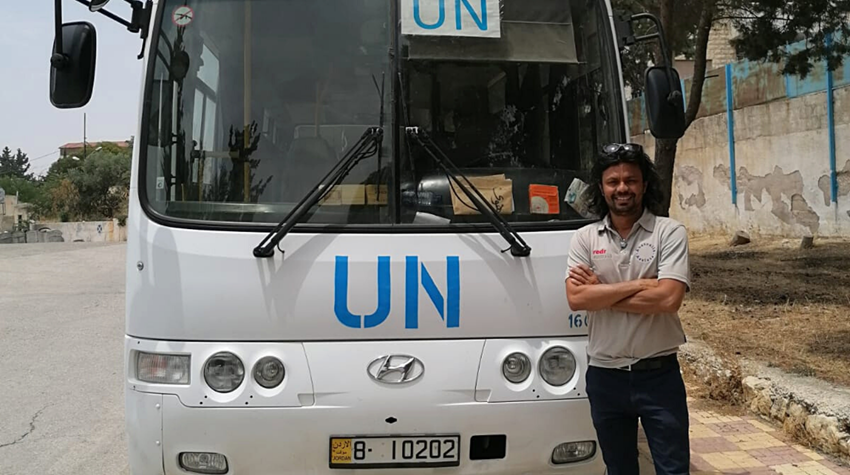Through the Australian Government’s Australia Assists program, Nisarg, an emergency management specialist from Melbourne, joined UNRWA’s Covid-19 Response Taskforce as an Emergency Officer. UNRWA provides education, health, relief and social services, camp improvement, sanitation and hygiene to eligible refugees living in the recognised camps.
The shock of Covid-19 has meant the refugees face a potentially catastrophic situation. UNRWA, already struggling financially, has had to constantly adapt its way of working to the ever-evolving situation on the ground to be able to continue to deliver essential services. So far, UNRWA has been successful in this endeavour despite the added cost and workload.
Nisarg explains that the primary role of the taskforce is to provide basic human rights and relief to the 5.7 million refugees across these five locations.
"This important and lifesaving work ensured key services, such as food and cash assistance, education, health care, sanitation and camp improvements continued, if not improved."
"This was an extremely challenging, complex and lifesaving response exercise due to the geopolitical situation in the region and financial crisis facing UNRWA."
"Many of the refugees in the region are on the brink of falling under the abject poverty line and the Covid-19 response programme and relief interventions does not have the option to fail. It achieves in providing basic human rights, such as food, shelter, education and health care, to the vast majority of vulnerable people, in an extremely volatile situation," says Nisarg.
In total, Nisarg spent nine months in this role and supported the Covid-19 pandemic, the ongoing Syrian conflict, the Beirut Blast, and the West Bank and Gaza humanitarian issues. His key achievements during his deployment included developing UNRWA Covid-19 situational monthly reports that were used by humanitarian workers and decision makers across the region, and a Business Continuity Plan for the agency and it’s 30,000 plus workforce.
Nisarg has spent more than 10 years working in emergency management and disaster risk recovery and has responded to disasters such as floods and cyclones in Australia and the Asia Pacific, and most recently the devastating 2019 Australian bushfires. Despite this, he says the term resilience now has a new meaning to him.
"I am used to working in an emergency setting, but the scale and the impact of the pandemic is unprecedented in the region and for UNRWA."
"My role involved response to a unique and unprecedented emergency in the form of COVID-19 on top of one of the longest ongoing humanitarian crises in the world. The project was providing relief assistance to already vulnerable Palestine Refugees in the region. I gained valuable experience responding to a humanitarian crisis in the midst of global pandemic."
Nisarg says, "Although the deployment was challenging at times, I learnt a lot. UNRWA’s innovative ways to adapt to new challenges and keep providing relief, resilience amongst the Palestine refugees under challenging circumstances, and working with very skilled and talented colleagues at UNRWA were all highlights. Personally, it has reignited my passion for working in the humanitarian sector to provide relief assistance to the most vulnerable members of our global community."


